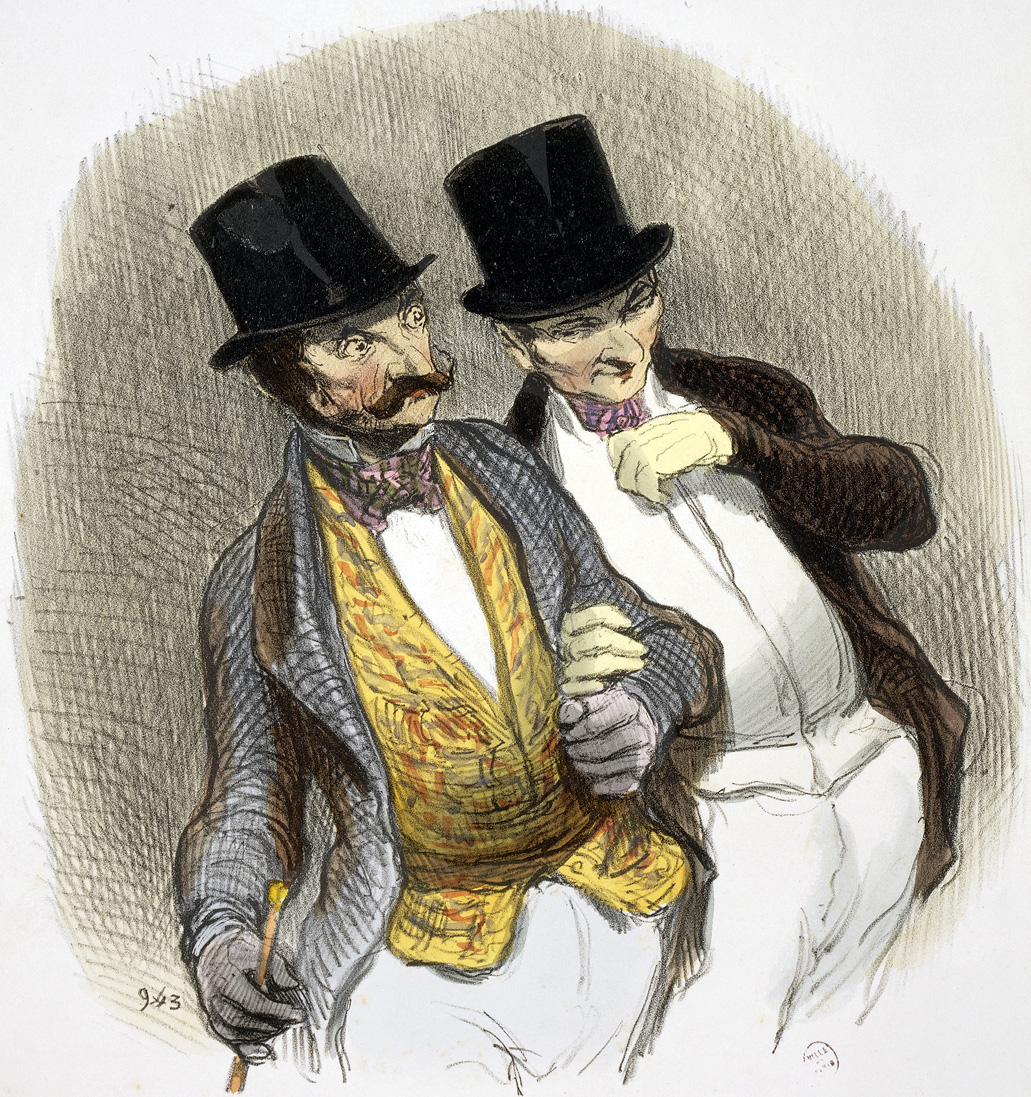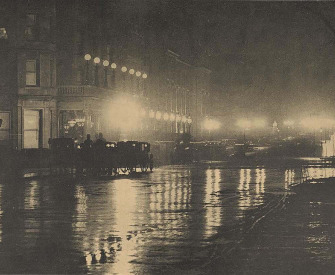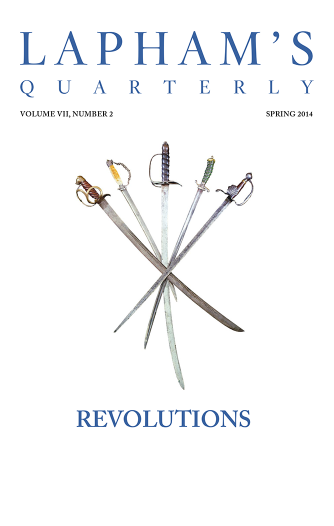In the living room, in a corner of the davenport, Ted settled down to his home study; plane geometry, Cicero, and the agonizing metaphors of Comus.
“I don’t see why they give us this old-fashioned junk by Milton and Shakespeare and Wordsworth and all these has-beens,” he protested. “Oh, I guess I could stand it to see a show by Shakespeare, if they had swell scenery and put on a lot of dog, but to sit down in cold blood and read ’em—These teachers—how do they get that way?”
Mrs. Babbitt, darning socks, speculated, “Yes, I wonder why. Of course I don’t want to fly in the face of the professors and everybody, but I do think there’s things in Shakespeare—not that I read him much, but when I was young the girls used to show me passages that weren’t, really, they weren’t at all nice.”
Babbitt looked up irritably from the comic strips in the Evening Advocate. They composed his favorite literature and art, these illustrated chronicles in which Mr. Mutt hit Mr. Jeff with a rotten egg, and Mother corrected Father’s vulgarisms by means of a rolling pin. With the solemn face of a devotee, breathing heavily through his open mouth, he plodded nightly through every picture, and during the rite he detested interruptions. Furthermore, he felt that on the subject of Shakespeare he wasn’t really an authority. Neither the Advocate-Times, the Evening Advocate, nor the Bulletin of the Zenith Chamber of Commerce had ever had an editorial on the matter, and until one of them had spoken he found it hard to form an original opinion. But even at risk of floundering in strange bogs, he could not keep out of an open controversy.
“I’ll tell you why you have to study Shakespeare and those. It’s because they’re required for college entrance, and that’s all there is to it! Personally, I don’t see myself why they stuck ’em into an up-to-date high school system like we have in this state. Be a good deal better if you took Business English and learned how to write an ad or letters that would pull. But there it is, and there’s no talk, argument, or discussion about it! Trouble with you, Ted, is you always want to do something different! If you’re going to law school—and you are!—I never had a chance to, but I’ll see that you do—why you’ll want to lay in all the English and Latin you can get.”

Having Just Fleeced Someone, by Honoré Daumier, 1846. © Gianni Dagli Orti, The Art Archive at Art Resource, NY
“Oh punk. I don’t see what’s the use of law school—or even finishing high school. I don’t want to go to college ’specially. Honest, there’s lot of fellows that have graduated from colleges that don’t begin to make as much money as fellows that went to work early. Old Shimmy Peters, that teaches Latin in the High, he’s a what-is-it from Columbia and he sits up all night reading a lot of greasy books and he’s always spieling about the ‘value of languages,’ and the poor soak doesn’t make but eighteen hundred a year, and no traveling salesman would think of working for that. I know what I’d like to do. I’d like to be an aviator, or own a corking big garage, or else—a fellow was telling me about it yesterday—I’d like to be one of these fellows that the Standard Oil Company sends out to China, and you live in a compound and don’t have to do any work, and you get to see the world and pagodas and the ocean and everything! And then I could take up correspondence courses. That’s the real stuff! You don’t have to recite to some frosty-faced old dame that’s trying to show off to the principal, and you can study any subject you want to. Just listen to these! I clipped out the ads of some swell courses.”
He snatched from the back of his geometry half a hundred advertisements of those home-study courses which the energy and foresight of American commerce have contributed to the science of education. The first displayed the portrait of a young man with a pure brow, an iron jaw, silk socks, and hair like patent leather. Standing with one hand in his trouser pocket and the other extended with chiding forefinger, he was bewitching an audience of men with gray beards, paunches, bald heads, and every other sign of wisdom and prosperity. Above the picture was an inspiring educational symbol—no antiquated lamp or torch or owl of Minerva, but a row of dollar signs. The text ran:
$ $ $ $ $ $ $ $ $
POWER AND PROSPERITY
IN PUBLIC SPEAKING
PROF. W. F. PEET author of the Shortcut Course in Public Speaking, is easily the foremost figure in practical literature, psychology & oratory. A graduate of some of our leading universities, lecturer, extensive traveler, author of books, poetry, etc., a man with the unique PERSONALITY OF THE MASTER MINDS, he is ready to give YOU all the secrets of his culture and hammering Force, in a few easy lessons that will not interfere with other occupations.
What We Teach You!
How to address your lodge. • How to give toasts. • How to tell dialect stories. • How to propose to a lady. • How to entertain banquets. • How to make convincing selling-talks. • How to build big vocabulary. • How to create a strong personality. • How to become a rational, powerful, and original thinker. • How to be a MASTER MAN!
ARE YOU A 100 PERCENTER OR A 10 PERCENTER?
Babbitt was again without a canon which would enable him to speak with authority. Nothing in motoring or real estate had indicated what a Solid Citizen and Regular Fellow ought to think about culture by mail. He began with hesitation:
“Well—sounds as if it covered the ground. It certainly is a fine thing to be able to orate. I’ve sometimes thought I had a little talent that way myself, and I know darn well that one reason why a four-flushing old back number like Chan Mott can get away with it in real estate is just because he can make a good talk, even when he hasn’t got a doggone thing to say! And it certainly is pretty cute the way they get out all these courses on various topics and subjects nowadays. I’ll tell you, though: no need to blow in a lot of good money on this stuff when you can get a first-rate course in eloquence and English and all that right in your own school—and one of the biggest school buildings in the entire country!”
“That’s so,” said Mrs. Babbitt comfortably, while Ted complained:
“Yuh, but Dad, they just teach a lot of old junk that isn’t any practical use—except the manual training and typewriting and basketball and dancing—and in these correspondence courses, gee, you can get all kinds of stuff that would come in handy. Say, listen to these.”
The advertisements were truly philanthropic. One of them bore the rousing headline: “Money! Money!! Money!!!” The second announced that “Mr. P. R., formerly making only eighteen a week in a barbershop, writes to us that since taking our course he is now pulling down five thousand dollars as an Osteo-vitalic Physician;” and the third that “Miss J. L., recently a wrapper in a store, is now getting Ten Real Dollars a day teaching our Hindu System of Vibratory Breathing and Mental Control.”
Ted had collected fifty or sixty announcements, from annual reference books, from Sunday school periodicals, fiction magazines, and journals of discussion. One benefactor implored, “Don’t be a Wallflower—Be More Popular and Make More Money—You Can Ukulele or Sing Yourself into Society! By the secret principles of a Newly Discovered System of Music Teaching, anyone—man, lady, or child—can, without tiresome exercises, special training, or long-drawn-out study, and without waste of time, money, or energy, learn to play by note, piano, banjo, cornet, clarinet, saxophone, violin, or drum, and learn sight-singing.”
The next, under the wistful appeal “Fingerprint Detectives Wanted—Big Incomes!” confided: “YOU red-blooded men and women—this is the PROFESSION you have been looking for. There’s MONEY in it, BIG money, and that rapid change of scene, that entrancing and compelling interest and fascination, which your active mind and adventurous spirit crave. Think of being the chief figure and directing factor in solving strange mysteries and baffling crimes. This wonderful profession brings you into contact with influential men on the basis of equality, and often calls upon you to travel everywhere, maybe to distant lands—all expenses paid. NO SPECIAL EDUCATION REQUIRED.”
“Oh, boy! I guess that wins the firebrick necklace! Wouldn’t it be swell to travel everywhere and nab some famous crook!” whooped Ted.
“Well, I don’t think much of that. Doggone likely to get hurt. Still, that music-study stunt might be pretty fair, though. There’s no reason why, if efficiency experts put their minds to it the way they have to routing products in a factory, they couldn’t figure out some scheme so a person wouldn’t have to monkey with all this practicing and exercises that you get in music.” Babbitt was impressed, and he had a delightful parental feeling that they two, the men of the family, understood each other.

A Man Tricked By Gypsies, by Leonardo da Vinci, c. 1493.
He listened to the notices of mailbox universities which taught Short-Story Writing and Improving the Memory, Motion-Picture Acting and Developing the Soul-Power, Banking and Spanish, Chiropody and Photography, Electrical Engineering and Window-Trimming, Poultry-Raising and Chemistry.
“Well—well—” Babbitt sought for adequate expression of his admiration. “I’m a son of a gun! I knew this correspondence school business had become a mighty profitable game—makes suburban real estate look like two cents!—but I didn’t realize it’d got to be such a reg’lar key industry! Must rank right up with groceries and movies. Always figured somebody’d come along with the brains to not leave education to a lot of bookworms and impractical theorists but make a big thing out of it. Yes, I can see how a lot of these courses might interest you. I must ask the fellows at the athletic club if they ever realized—but same time, Ted, you know how advertisers, I mean some advertisers, exaggerate. I don’t know as they’d be able to jam you through these courses as fast as they claim they can.”
“Oh sure, Dad; of course.” Ted had the immense and joyful maturity of a boy who is respectfully listened to by his elders. Babbitt concentrated on him with grateful affection:
“I can see what an influence these courses might have on the whole educational works. Course I’d never admit it publicly—fellow like myself, a State U. graduate, it’s only decent and patriotic for him to blow his horn and boost the alma mater—but smatter of fact, there’s a whole lot of valuable time lost even at the U., studying poetry and French and subjects that never brought in anybody a cent. I don’t know but what maybe these correspondence courses might prove to be one of the most important American inventions.”
From Babbitt. Lewis published Main Street in 1920 and Babbitt in 1922—both of which were bestsellers and contenders for the Pulitzer Prize. He received that award for his ninth novel, Arrowsmith, but declined the honor, stating publicly in 1927 that the prize’s stipulation concerning the presentation of “the wholesome atmosphere of American life” was such that it was given to books “not according to their actual literary merit but in obedience to whatever code of Good Form may chance to be popular at the moment.” He did, however, accept the Nobel Prize in Literature in 1930, becoming the first American to be so recognized.
Back to Issue







